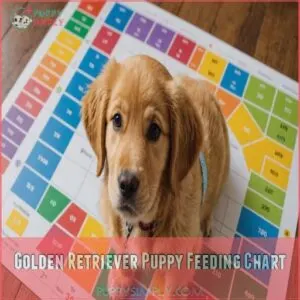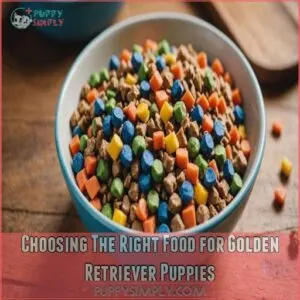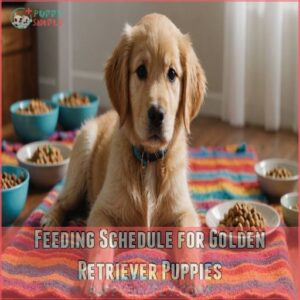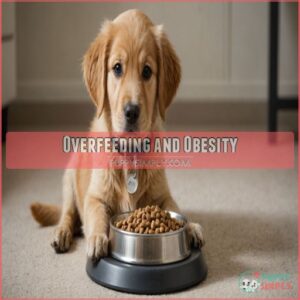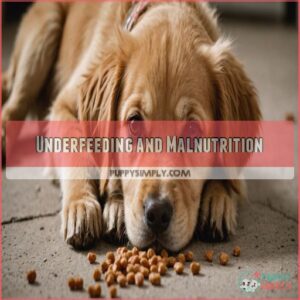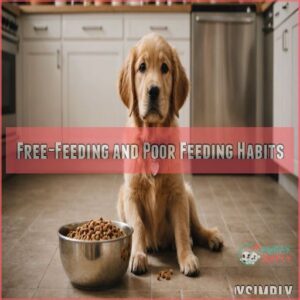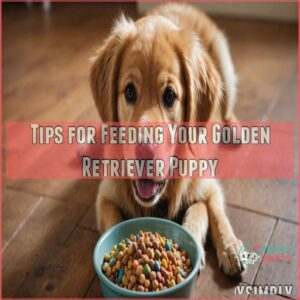This site is supported by our readers. We may earn a commission, at no cost to you, if you purchase through links.
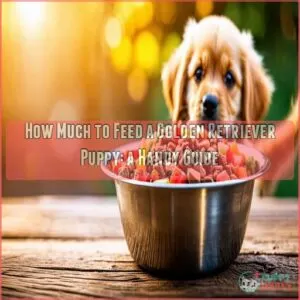 Feeding a golden retriever puppy isn’t rocket science, but it does require a bit of planning.
Feeding a golden retriever puppy isn’t rocket science, but it does require a bit of planning.
At 3 months, aim for about 1.5 cups of high-quality puppy food a day.
By 4 months, you can bump this up to around 2.5 cups.
As they grow, males might need up to 4 cups daily by 7 months, while females typically stick to 3 cups.
Balance is key, so always consider your pup’s activity level and weight.
Remember, they’re growing fast and need the right fuel!
Curious about creating the perfect feeding schedule or choosing the best food?
There’s plenty more to explore.
Table Of Contents
- Key Takeaways
- Golden Retriever Puppy Feeding Chart
- Factors Affecting Golden Retriever Puppy Food Intake
- How to Calculate Golden Retriever Puppy Food Portions
- Choosing The Right Food for Golden Retriever Puppies
- Importance of Large Breed Puppy Food
- Golden Retriever Puppy Nutrition and Development
- Feeding Schedule for Golden Retriever Puppies
- Signs of a Well-Fed Golden Retriever Puppy
- Common Feeding Mistakes to Avoid
- Tips for Feeding Your Golden Retriever Puppy
- Frequently Asked Questions (FAQs)
- How much food should you feed a Golden Retriever puppy?
- Can you overfeed a Golden Retriever puppy?
- How much to feed a puppy chart?
- How much should a 12 week old Golden Retriever puppy weigh?
- How to transition to adult dog food?
- What supplements are beneficial for puppies?
- How to address food allergies in puppies?
- Is home-cooked food suitable for puppies?
- Are raw diets safe for Golden Retriever puppies?
- Conclusion
Key Takeaways
- Adjust feeding amounts as your pup grows: Start with about 1.5 cups a day at 3 months and increase to 4 cups by 7 months if needed, considering their activity level.
- Use a feeding chart to guide meal portions based on age and weight, ensuring your puppy gets the right nutrients for healthy growth.
- Choose high-quality, large breed puppy food that contains joint-supporting nutrients such as glucosamine and Omega-3s for puppy joint support to support development, focusing on high protein and balanced nutrients.
- Stick to a consistent feeding schedule with 3-4 small meals daily, transitioning to 2 meals as they mature, and always provide fresh water.
Golden Retriever Puppy Feeding Chart
Keeping track of your Golden Retriever puppy’s meal portions is important, and a feeding chart designed by age, weight, and activity level can make this task easier.
You’ll quickly learn to balance their growing needs with just the right amount of food—no need for pupper-sized stretchy pants!
Feeding Chart by Age
Think of puppy feeding as a balancing act.
With Golden Retrievers, this means serving three to four small meals daily for those under six months.
According to general guidelines, puppies require 2-3 times more food depending on breed and age, as determined by their body condition scores.
Puppy food recommendations suggest sticking to a feeding chart by age to meet nutritional needs for healthy growth.
Remember, large breed puppy food is key to providing the necessary nutrients for their active lives.
Feeding Chart by Weight and Activity Level
Ever wondered how weight and activity impact your Golden’s feeding schedule?
Here’s a quick guide!
For a balanced diet, focus on high-protein, high-fat puppy food that fuels muscle growth and energy levels, and consider a puppy food with the AAFCO statement for complete nutrition.
Light Activity: Keep meals smaller, around 2 cups.
Moderate Activity: Increase to 2.5–3 cups daily.
Intense Activity: Bump it to 3–4 cups.
Remember, portion control helps manage puppy growth and weight control for healthy growth and energy!
General Guidelines for Puppy Feeding
You’re wrapping up the puzzle of puppy weight and activity.
Now, focus on the feeding frequency for your Golden Retriever.
Consider bowl size and food brand when planning the puppy feeding timeline.
Regular meal timing keeps them healthy.
Here’s a simple chart:
| Feeding Frequency | Puppy Age (Months) |
|---|---|
| 4 times/day | 0-3 |
| 3 times/day | 4-6 |
| 2 times/day | 6+ |
Factors Affecting Golden Retriever Puppy Food Intake
Feeding your Golden Retriever puppy just the right amount involves more than simply following a chart.
Their age, weight, and activity level play key roles, making your pup’s food intake as unique as their adorable snores.
Age and Development Stage
So, you’ve got your feeding chart handy? Great! Now, let’s talk puppy development.
A Golden Retriever’s nutritional needs change dramatically as they transition through distinct growth phases. A Golden Retriever’s nutritional needs change dramatically as they grow.
Those tiny pups need frequent, smaller meals, which is why you should choose the right Golden Retriever Puppy Food.
As they get older, you can space those meals out.
Remember those puppy growth milestones? They’re your guide.
Watch for changes in appetite—it’s a clue to their needs.
Always check with your vet for personalized advice.
Weight and Activity Level
Balancing your Golden Retriever puppy’s weight with their activity level feels like juggling, right?
If your pup’s bounding around like an Olympic athlete, they’ll need more puppy food to keep up.
A proper exercise routine helps maintain puppy weight gain and healthy puppy growth, which can be supported by choosing a puppy food that has the right vitamins for puppies.
Keep an eye on their energy levels and tweak the feeding schedule for the best puppy health.
Individual Caloric Needs
Every Golden Retriever puppy has its unique caloric needs.
These depend on factors like age, breed, activity level, metabolism, and even genetics.
While a Golden Retriever feeding chart gives you a rough estimate, it’s a starting point.
You’ll need to adjust based on your puppy’s growth and energy.
Remember, too much puppy chow can lead to unnecessary weight gain.
How to Calculate Golden Retriever Puppy Food Portions
Feeding your Golden Retriever puppy the right amount can feel like trying to measure your excitement at their wagging tail!
By using a feeding chart and regularly adjusting portion sizes based on their weight and activity, you’ll make sure they’re getting the nutrients they need for healthy growth.
Using The Feeding Chart
Imagine you’re staring at a feeding chart and wondering what on earth it’s all about.
You’re not alone!
These charts, while not foolproof, offer a ballpark figure to guarantee your Golden Retriever’s dietary needs are met.
Consider brand differences and misinterpretations.
Adjust based on your puppy’s growth and energy levels, keeping them on a balanced feeding schedule.
Measuring Food Intake
Ever wonder if you’re feeding your Golden Retriever puppy enough?
Begin with a food bowl size that matches your puppy’s needs, not just their tummy size.
Measure portions using calorie counting for accuracy.
Frequent meals help, so stick to a consistent feeding frequency.
Monitor their weight regularly; remember, portion control isn’t just for humans—your pup’s diet affects their growth too!
Adjusting Portion Sizes
Adjusting portion sizes for your Golden Retriever puppy isn’t a mystical art—it takes some thought and planning.
Keep their growth on the right track with a few key strategies:
- Monitor puppy weight gain regularly
- Adjust food volume as activity changes
- Consider calorie needs shifts
- Stick to feeding frequency
- Choose AAFCO approved dog food
This balanced approach keeps pups healthy!
Choosing The Right Food for Golden Retriever Puppies
Picking the right food is important for your pup’s growth! Look for high-quality ingredients, specifically large-breed puppy formulas approved by the AAFCO, to make sure your Golden Retriever thrives.
Look for High-Quality Ingredients
Choosing a puppy food with high-quality ingredients is essential for your Golden Retriever’s health.
Consider exploring options at a Best Puppy Food marketplace.
Look for protein sources like chicken or beef, and avoid fillers and additives that can cause allergies or health issues.
Investing in quality now can save on vet bills later.
Think of it as laying a foundation for a lifetime of wellness for your furry friend.
Consider Large Breed Puppy Food
You’re eyeing the ingredients list, now consider large breed puppy food.
It’s like giving your Golden the royal treatment.
This food supports joint health, helps prevent digestive issues and bloat, and aids growth and development.
- Promotes healthy joints
- Prevents digestive troubles
- Reduces bloat risk
- Supports balanced growth
- Matches nutritional needs perfectly
It’s all about smart choices for your pup’s future.
Check for AAFCO Approval
After selecting a large breed puppy food, check the bag for the AAFCO approval stamp, similar to how you’d make sure the right nutrients for Goldendoodles with joint health considerations like supporting joint supplements.
This guarantees you’re feeding your Golden Retriever pup a nutritionally balanced diet.
Think of it as the food’s seal of quality, guaranteeing the right blend of nutrients.
It’s like having a safety net in puppy nutrition—simple, reliable, and essential.
Importance of Large Breed Puppy Food
Feeding your Golden Retriever puppy large breed puppy food that is rich in glucosamine and chondroitin, such as foods with joint care ingredients, is important for supporting healthy growth and preventing future health issues.
This type of food is specially formulated to promote ideal weight, ensuring those playful zoomies don’t turn into unplanned belly flops.
Supports Healthy Growth and Development
A large breed puppy food is like a growth engine for your Golden Retriever puppy, supporting their healthy growth and development.
It’s designed to meet their unique needs with lower calcium levels, controlled phosphorus levels, and fewer fat and calories to reduce the risk of developmental orthopedic diseases.
- Balanced nutrients: Promotes strong bones and joints.
- Vitamins and minerals: Provides proper puppy nutrition.
- Proper calorie count: Maintains a healthy weight.
Stick with it to hit growth milestones effortlessly!
Prevents Health Problems
A balanced nutrient profile, including fiber-rich foods that can help keep things moving smoothly, is essential for a puppy’s digestive health, as seen in the importance of puppy food for digestive health. Large breed puppy food plays a pivotal role in preventing health problems for your Golden Retriever puppy.
It aids in bloat prevention, supports joint health, and combats puppy obesity.
Specific formulas address food allergies and guarantee parasite control.
Whether you’re considering Golden Retriever homemade food or the BARF diet, consulting the Science Diet can keep your pup bouncing happily into adulthood.
Promotes Optimal Weight
Because of their rapid growth, Golden Retriever puppies need special attention to weight management.
Using large breed puppy food is key; it’s formulated with the right balance of nutrients to support healthy growth without excessive weight gain.
Here’s how to keep your pup at a healthy weight:
- Choose a food specifically designed for large breeds.
- Follow the feeding guidelines on the package.
- Monitor your puppy’s weight regularly.
- Adjust food portions based on your puppy’s activity level.
- Consult your vet for personalized advice.
Golden Retriever Puppy Nutrition and Development
Ensuring your Golden Retriever puppy gets the right nutrition is like giving them a healthy head start in life—minus the superhero cape.
Focus on providing a balanced diet rich in proteins, calcium, and carbohydrates to support their rapid growth and boundless energy.
Protein Requirements for Puppies
A Golden Retriever puppy needs plenty of protein to fuel its growth and muscle development.
Think of protein as the building blocks for their energetic adventures!
Amino acids from quality protein sources, like chicken or beef, are essential.
Don’t overlook fats and omega fatty acids—they’re highly important for coat health and energy.
Prioritize these nutritional needs for a thriving puppy.
Importance of Calcium for Bone Growth
Protein-powered puppies need more than just muscles; strong bones are essential, too!
That’s where calcium kicks in, preventing those deficiency risks hovering over bone development stages.
Include calcium-rich foods in your puppy’s diet or even supplements after a vet chat.
Brands like The Farmers Dog can help balance those nutrients.
Remember, too much Golden Retriever table food might hinder growth.
Role of Carbohydrates in Puppy Diet
Just like fuel for a car, carbohydrates are essential energy sources for your Golden Retriever puppy.
They power playtime and support digestive health.
Opt for complex carbs like brown rice and oats over simple carbs.
This choice helps maintain steady energy levels but also keeps tummies content.
Remember, a balanced diet sets the stage for healthy growth.
Feeding Schedule for Golden Retriever Puppies
Creating a feeding schedule for your Golden Retriever puppy helps them get the right nutrients at the right time.
You’ll want to balance frequent meals with portion control, or you might end up with a puppy who waddles more than it runs!
Frequency of Feeding for Puppies
Thinking about your Golden Retriever puppy’s nutrition naturally leads to feeding schedules.
Puppies, like little dynamos, need their fuel several times a day to keep up with their growth and playtime.
You’ll want to feed them:
- 3 to 4 meals daily
- Until 6 months old
- Keep portions small
- Prevent overeating
- Make sure they’ve steady energy
This rhythm aids healthy development.
Tips for Creating a Feeding Schedule
Now that you’ve nailed meal frequency, let’s create a schedule.
Pick consistent food times; puppies thrive on routine.
Portion control is key; follow the feeding guidelines.
Limit treats; they add extra calories.
Consistency is your friend; a predictable schedule eases anxiety.
Remember, a happy puppy is a well-fed puppy!
How to Transition to Adult Food
You’ve mastered your puppy’s feeding schedule, so let’s switch gears to seasoning their diet for adulthood.
Start the gradual shift to adult food around 12 months to avoid tummy troubles.
Consider their puppy preferences when choosing new flavors.
Benefits? More balanced nutrition for grown-up energy.
- Introduce new food slowly
- Mix with old food
- Monitor digestive changes
- Adjust meal portions
- Consult your vet
Signs of a Well-Fed Golden Retriever Puppy
You’ll know your Golden Retriever puppy is well-fed when you can feel their ribs without them being visible, and they’re full of energy, ready to play fetch at a moment’s notice.
Bright eyes, smooth skin, and a hearty appetite are clear signs that they’re getting the right nutrition to grow healthy and strong.
Visible Ribs and a Healthy Weight
Getting your puppy’s feeding schedule just right helps maintain a healthy weight.
You should be able to feel their ribs without them being too visible.
A quick weight check helps make sure a slim puppy is on track for healthy growth.
Balance is key for proper weight management—think of it as adjusting the strings on a guitar for harmony.
Bright Eyes and Smooth Skin
Spotting bright eyes and smooth skin is a clear sign your Golden Retriever puppy is thriving.
Just like finding a needle in a haystack, it’s a relief to see a pup’s shiny fur and healthy coat.
A balanced diet with proper puppy nutrition supports these vibrant features, enhancing their overall skin care and coat health.
High Energy Levels and a Good Appetite
Bright eyes relate directly to an energetic pup.
A Golden Retriever puppy that’s well-fed will zoom around with excitement.
Look for these signs:
- Puppy growth spurts keep energy up.
- Playtime hunger signals a healthy appetite.
- Training treats make sure they’re enthusiastic learners.
- Healthy snacks round out their day.
Always be attentive to food allergies that could impact their vigor.
Common Feeding Mistakes to Avoid
Feeding your Golden Retriever puppy might seem straightforward, but it’s easy to make mistakes like overfeeding, which can lead to obesity, or underfeeding, resulting in malnutrition.
Avoid free-feeding to prevent poor habits and make sure you’re setting your pup up for a healthy, energetic life.
Overfeeding and Obesity
So, you’ve got a healthy-looking pup? Great. But even with a thriving appetite, overfeeding is a real risk.
Too many treats and oversized portions lead to weight problems.
Check your pup’s growth with a Puppy Weight Chart to make sure they’re on track.
Remember, portion control and regular exercise are key for weight management.
Healthy treats in moderation are fine, but don’t let them derail your pup’s diet.
Prevent those overfeeding risks by sticking to a measured feeding schedule.
A happy, healthy weight keeps your Golden Retriever happy and healthy for years to come.
Underfeeding and Malnutrition
Underfeeding can stunt your Golden Retriever puppy’s growth and lead to malnutrition.
Here’s how to spot signs of trouble:
- Ribs too visible: Quietly check for protruding ribs.
- Low energy levels: A sluggish pup might need more fuel.
- Growth chart comparison: Compare your puppy’s size regularly.
- Dietary deficiencies: Make sure your puppy receives balanced nutrition.
- Feeding frequency impact: Stick to consistent meal times.
Free-Feeding and Poor Feeding Habits
While underfeeding causes malnutrition, leaving food out to graze can lead to overeating and obesity risk.
Free-feeding isn’t ideal for puppies prone to mealtime stress or food aggression.
Instead, set specific meal times. This approach keeps them from becoming picky eaters, maintains a healthy weight, and guarantees they get the right nutrients.
Balance is key for happy, healthy pups.
Tips for Feeding Your Golden Retriever Puppy
Feeding your Golden Retriever puppy doesn’t have to be a guessing game if you establish a regular feeding schedule and stick to it.
Remember to encourage slow eating and always provide fresh water to keep your lively pup healthy and happy.
Set a Regular Feeding Schedule
Establishing a regular feeding schedule for your Golden Retriever puppy is like setting the beat for a drum circle.
It’s all about consistency and timing. Feed your puppy at the same times daily to align with their natural routine.
This helps their digestion and energy levels stay stable, promoting healthy development.
Plus, it’s easier to track their food intake!
Consider Feeding in a Crate
Imagine setting a regular feeding schedule, then think about feeding in a crate.
It’s a game-changer for crate training benefits and creating a calm eating environment.
Your puppy associates the crate with positive experiences, making it a safe and cozy spot.
Focus on the crate size guide and make sure crate feeding is safe, steering clear of mess and chaos.
Encourage Slow Eating
Feeding your Golden Retriever puppy can be a whirlwind.
To curb those speedy eating habits of theirs, introduce some puzzle feeders or slow feeder bowls.
These nifty tools slow down eating speed, making meals more of a leisurely activity.
Try scattering kibble across a flat surface or using food puzzles to engage their curious minds while promoting better digestion.
Provide Fresh Water
Always keep a clean water bowl readily available; puppy hydration is key!
A appropriately-sized bowl makes it easy for your pup to access water.
Monitor water intake; adjust bowl size if needed.
Clean the bowl daily to maintain water quality.
Frequent refills are essential, especially after meals.
These simple hydration tips help your pup thrive.
Remember, a well-hydrated puppy is a happy puppy!
Frequently Asked Questions (FAQs)
How much food should you feed a Golden Retriever puppy?
Start your Golden Retriever puppy on frequent small meals.
Feed them 5 to 2 cups of high-quality puppy food daily, split into three or four meals.
As they grow, adjust portions based on activity and vet advice.
Can you overfeed a Golden Retriever puppy?
Sure, you can spoil a Golden Retriever puppy with too much love and kibble.
Overfeeding can lead to obesity, causing joint problems and reducing their energy.
Stick to recommended portions for a healthy, happy pup.
How much to feed a puppy chart?
Feeding your puppy requires vigilance and balance.
Use a feeding chart suited to your puppy’s breed and age.
Generally, puppies need 3-4 small meals daily, adjusting portions as they grow.
Consult your vet for precise advice.
How much should a 12 week old Golden Retriever puppy weigh?
At 12 weeks old, your Golden Retriever puppy typically weighs around 15 to 20 pounds.
They should gain about 5 to 3 pounds weekly.
Monitor their weight and adjust feeding to maintain a healthy growth rate.
How to transition to adult dog food?
Start by mixing adult and puppy food, slowly increasing the adult portion over a couple of weeks.
Monitor your pup’s weight and stool consistency.
Consult your vet if you have concerns.
What supplements are beneficial for puppies?
Puppies benefit from DHA for brain development, calcium for strong bones, and probiotics for digestion.
Fish oil supports healthy skin and coats.
Always consult your vet before adding supplements to make sure they’re safe and beneficial.
How to address food allergies in puppies?
When it rains, it pours.
If your puppy shows allergy signs, switch to a hypoallergenic diet.
Explore options like limited ingredient diets, avoid common allergens like beef or chicken, and consult your vet for personalized advice.
Is home-cooked food suitable for puppies?
Home-cooked food for puppies can work if it’s carefully planned.
Always consult your vet to make sure your pup’s diet meets all nutritional needs.
Aim for balanced meals with the right proteins, carbs, vitamins, and minerals.
Are raw diets safe for Golden Retriever puppies?
Think twice before jumping into raw diets for Golden Retriever puppies.
Consult your vet to guarantee nutritional balance, as raw diets lack certain nutrients.
Safety hinges on careful preparation and understanding potential risks like bacteria exposure.
Conclusion
Wondering how much to feed a golden retriever puppy?
Keeping your pup healthy and happy involves more than just filling the bowl.
Monitor their weight, consider their activity level, and adjust portions as they grow.
Choose high-quality, large breed puppy food, which often includes ingredients rich in antioxidants for puppy growth Boosting Immune System, to support development and avoid common feeding mistakes.
Remember, a well-fed puppy has energy, shiny fur, and a cheerful disposition.
Stick to a regular feeding schedule and watch your furry friend thrive!

